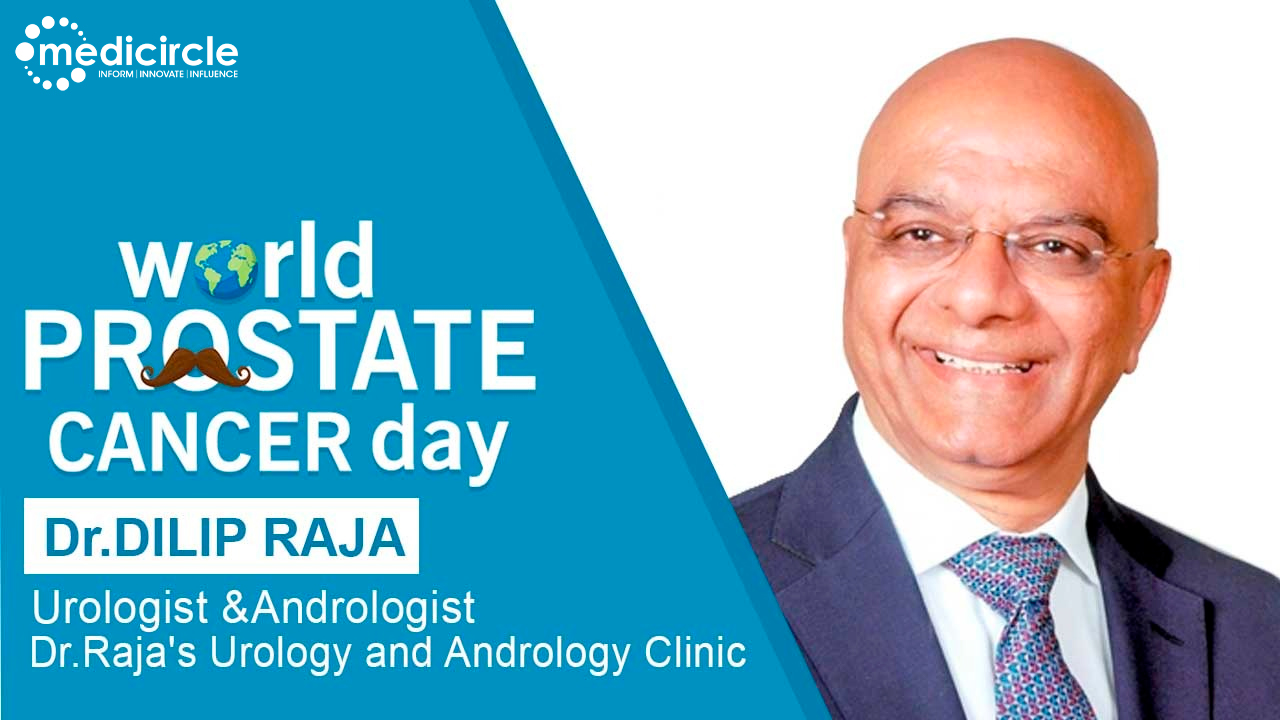Do you know 1 in 8 men are diagnosed with prostate cancer in their lifetime? It’s the second most common cancer found in men worldwide, and the risk of developing it increases in elderly men. The disease starts when cells begin to grow out of control in the prostate gland. The 5-year survival rate for prostate cancer in India is 64%. Old age, obesity, improper diet, and genetic alterations have been identified as some of the main contributing factors towards an increased cause of prostate cancer. Since September is National Prostate Awareness Month for 2021, Medicircle is conducting an exclusive awareness series to impart basic knowledge of prostate cancer and different treatments available for the same.
Dr. Dilip Raja runs his own clinic, Dr. Raja’s Urology & Andrology Centre, Mumbai. At present, he is a senior consultant Urologist, and Andrologist at Lilavati Hospital, Saifee Hospital, P. D. Hinduja (Khar), Breach Candy Hospital & Wockhardt Hospital. He has worked for more than 37 years in his field. He has large experience in treating stone patients with all the modalities like Per-Cutaneous Lithotripsy (PCNL) and Ureterorenoscopy (URS) as complete management of the stone disease. He is also visiting a Urologist and Andrologist in Dubai. He is one of the few Urologists and Andrologist to start newer technologies like electrovaporization of the prostate, benign implants, microsurgery in Urology in India.
Prostate cancer - Symptoms
Dr. Dilip says, “Prostate gland is walnut-sized which is located in the junction of the urinary bladder and urinary passage. It is generally present in males and the importance is usually felt after 50 years of age. Even young people may get prostate infections. Prostate cancer can be divided into benign and cancerous prostate. Infection of the prostate gland is known as prostatitis. The symptoms of benign and cancerous prostate largely overlap. Symptoms can be common – pain and/or a "burning sensation" when urinating or ejaculating, frequent urination, especially during the nighttime, trouble starting urination, or stopping urination once in progress, sudden erectile dysfunction, blood in either urine or semen, frequent infection, dissatisfaction even after passing urine. If you have any of these symptoms, you need to consult Urologist.
Prostate cancer surgery
Dr. Dilip mentions, “Prostate tumour grows gradually. If you do timely intervention with early diagnosis, you will get a 100% cure. Surgery is one of the answers for this. If the patient doesn’t want to undergo surgery, then radiotherapy can be given, but even that requires long treatment of 30-35 sessions and other things. Therefore, for early stage prostate cancer, surgery is most appropriate. Surgery is not recommended for metastatic stages of cancer when it has spread to lungs, bones, brain, lymph nodes. Thus, running away from surgery is not the wise thing, right surgery is needed for the right indication at the right time.”
Prostatitis and prostate cancer
Dr. Dilip emphasizes, “All man after the age of 50 should have their annual check-up for all the deformities and related tests for early diagnosis. If you are experiencing any of these symptoms, please see your Urologist. Early diagnosis helps prevent major complications and the severity of the disease.
Acute prostatitis with symptoms like burning sensation while urinating, pain, high degree fever often turns into chronic prostatitis. Prostatitis is an infection of the prostate, it does not necessarily lead to the cancer of prostate.``
Prostate cancer myths
While busting some myths, Dr. Dilip expresses, “After 50, every man gets affected with prostate cancer is a total misnomer. Patients visit doctors when they experience symptoms, it is the doctor’s duty to find out whether it is benign or cancerous. Just because someone has symptoms doesn’t mean that the person has cancer. It should be properly investigated first.
Three things are needed for diagnosing – Rectal examination, blood test - PSA (Prostate-specific antigen). If either of these or both comes positive, then a biopsy is done. For this, tissue from the prostate gland is taken and examined under a microscope. This tells whether it is cancerous or not.”
Dr. Dilip advises, “The best guidance for prostate cancer will be provided by your Urologist, you just need to visit them on time. Don’t do self-treatment, seek advice from the right person and take appropriate precautions under the guidance of a doctor.”
(Edited by Renu Gupta)

 Dr. Dilip Raja sheds light on prostate cancer – its symptoms and treatment. Dr. Dilip emphasizes the importance of early diagnosis and busted some myths related to it
Dr. Dilip Raja sheds light on prostate cancer – its symptoms and treatment. Dr. Dilip emphasizes the importance of early diagnosis and busted some myths related to it










.jpeg)






.jpeg)

.jpg)





.png)




